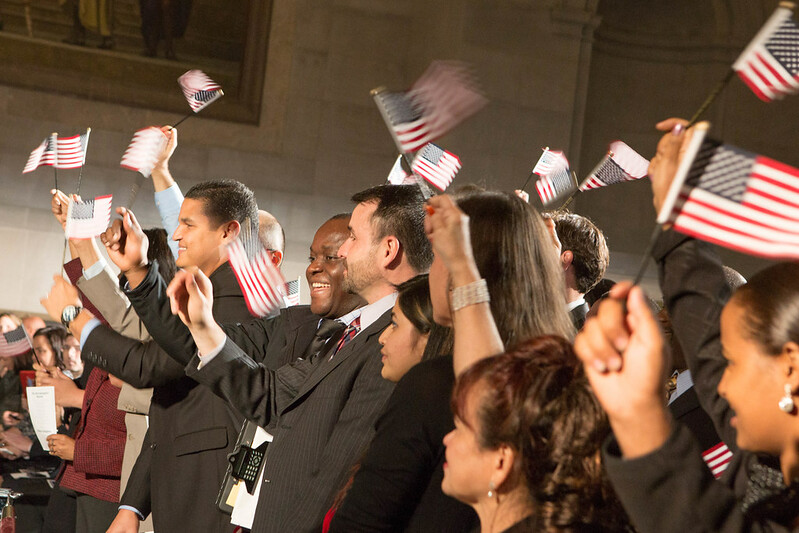
Citizenship candidates celebrate becoming U.S. citizens during a naturalization ceremony at the National Archives in Washington, DC, on December 15, 2015.
UPDATE 11.17.23: In a discussion with Candace Owens, Tucker Carlson called out commentators who hyperventilate about tragedies overseas, but turn a blind eye to problems here in America. Watch:
Tucker: “I’m an American. Our country is being invaded right now. Over 100,000 Americans die every year of fentanyl. Those are real tragedies. I’ve never seen anything like the emotion from any commentator around those tragedies as I’m watching about a foreign tragedy.” pic.twitter.com/cfjsfKJBKB
— TheBlaze (@theblaze) November 15, 2023
UPDATE 9.14.22: In a recent interview with Ari Blaff of Deseret News, Yoram Hazony defended nationalism, saying:
People who grow up in nationalist or religious environments have access to traditional knowledge and traditional concepts that people who grow up under liberalism don’t have.
I don’t think it’s surprising at all to see that Israelis or Brits or Poles or Hungarians or Indians often look at what’s happening in the United States with a much more intuitive understanding of what human beings are, of how human societies work and function, in ways that Americans don’t.
I grew up in the United States, and that means I was taught liberalism as the foundation for how you think about politics — first in high school, and then later in college. And then again in graduate school when I was doing my doctorate.
The questions that somebody from India or Israel would ask are: Where are your national traditions? Aren’t you overlooking them? How can you be describing everything on the basis of universal reason, which probably doesn’t exist? Why don’t you know anything about the political and religious traditions of your country?
As soon as you ask those questions, you can start looking.
Many even on the right in the United States have never actually seen a description of the English conservative tradition which is what I present in the first chapter of my book. Even professors who teach political theory have simply never encountered a discussion of who the prominent figures are, what their political theories are, and how they are connected to scripture and to Christianity. How (this tradition) made England free and great.
These are things that we should have learned in college, certainly in graduate school, but we didn’t. And the same thing is true with the American founding, which is almost universally taught as though there were not two political parties. It is constantly discussed as though the American founding fathers belonged to a single party with a single worldview — as though they were all Jeffersonians — and that’s not true.
But you can discover what the fights between liberals and conservatives were about during the American founding. You discover them by beginning with this intuition: that there is no such thing as a “national politics” where everybody agrees. There’s always one party that is more conservative than the other. And yes, my book is part of a larger project that I’ve been conducting with Jewish and Christian friends for some time, literally rediscovering the sources of conservatism.
Originally posted on July 17, 2019.
In The Wall Street Journal, William A. Galston discusses what it means to be American, and the difference between “Americans First” and “Americans Only.” He writes (abridged):
“Suddenly, it seems, nationalism is being discussed everywhere.
The term is used to explain, and often to justify, the success of the Brexit referendum in the U.K., the election of Donald Trump in the U.S., and increasing skepticism about international institutions and norms throughout the West.
Nationalism, proponents argue, has nothing to do with aggression against others. Instead it points inward, to the desire of every nation to be left alone and govern itself in accordance with its own traditions, says Yoram Hazony, a leading theorist of nationalism.
Nationalism is connected to political sovereignty through a compound idea—the nation-state. In this theory, each state is the political representative of a single nation, and the perimeter of the nation corresponds to the boundary of the state.
Sixty-three percent of Republicans, and 69% of voters who supported Donald Trump in the primaries, believe that you cannot be truly American if you haven’t lived in the U.S. for most of your life.
Sixty-three percent of Republicans and 72% of Trump primary voters go further: They say you aren’t truly American unless you were born here.
Fifty-six percent of Republicans and 63% of Trump primary voters assert that you cannot be truly American unless you are a Christian.
Disconcertingly, nearly a third of early Trump supporters also think true Americans must be of European heritage or descent.
To be fair, substantial numbers of Americans who do not support Mr. Trump also espouse these nationalist sentiments, which are anything but new. The share of Americans who believe that being Christian is part of being a true American is about the same as in the mid-1990s, and the share who think that being born here is essential to American identity is significantly lower.
Being fully American takes more than endorsing the Declaration of Independence and the Constitution.
It means accepting our history, with all its burdens, as one’s own.
If you’re willing to fight for Main Street America, click here to sign up for my free weekly email.




